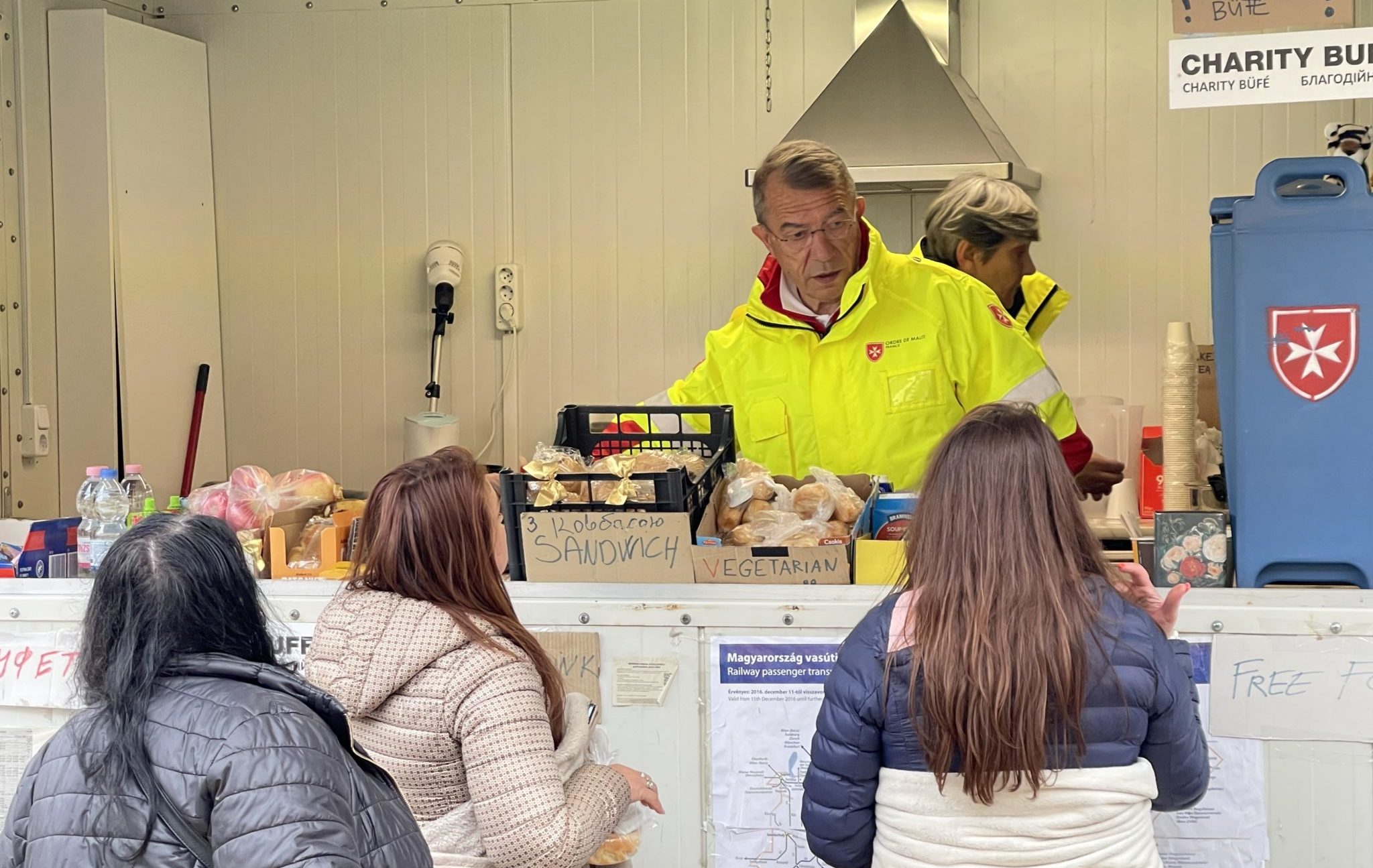It Takes A Village

I opened my eyes and looked out the window as the fields rolled by. I checked my watch. I had been asleep for almost two hours. Just about three more to go until we reach our destination: the small Hungarian village of Beregsurány, just a few kilometers from the border between Hungary and Ukraine.
The United Nations has estimated that more than 10 million people have been displaced by the current war between Russia and Ukraine. About 3.6 million of those displaced individuals have left the country completely. The bulk of the Ukrainian refugees, about 2.2 million, have made their way northwest into Poland, but a sizable chunk, between 500 to 600 thousand, have exited the country via the narrow border Ukraine shares with Hungary.
Since the Russian invasion began, Beregsurány, a quiet, rural town with a population of just over 600, has been transformed from a place where nothing much happens to one of Hungary’s five major centers devoted to processing and transporting refugees.
I was anxious to get there. Outside my window, the expanse of the Pannonian plain, where the great Roman Emperor Marcus Aurelius is thought to have written part of his Meditations, flashed by. It would only take us a few hours to traverse the lands where Aurelius and legionnaires spent about a decade in the second century A.D. Mindfulness and virtue weighed heavily on the brain here. I figured I could be patient.
The bus eventually pulled up to a wooden, Hungarian-style square archway and came to a stop. Myself and the other journalists on the trip—a few Spaniards, two Germans, two Poles, a Venezuelan, an Austrian, and two other Americans—filed out of the bus. Part of the arch’s beautiful carvings were covered in a canvas sign that said something in Hungarian I couldn’t make out. Underneath was some English: “Help Center.”
As we were snapping pictures of the arch, a burly man in military garb strode confidently down the gravel road towards us. As he got closer, I thought he was scowling at us, until he spoke with an undeniably jolly voice—albeit in Hungarian—that revealed what I thought was a scowl was just his crooked smile. He said he was an emissary sent by the mayor to bring us to the refugee processing site just down the gravel road, as the mayor was busy attending to other duties. He exchanged a few more words with our program coordinator, who was mostly working as a translator for the day, turned, and began marching down the gravel road.
We approached a pale yellow building that looked like some kind of villa, with a small portico with columns out front. I would later learn that this building was once a grand estate for one of the noble families in the area before the Nazi and then Soviet occupations. It is now the village’s town hall. As we rounded the backside, temporary buildings about seven feet wide and ten feet deep lined a portion of the paved driveway. Two were for medical examinations, another was a restroom. Other pop-up tents, trailers, and kiosks full of medical supplies, food, and other necessities were stationed along the back of the former villa. The installations were set up by the Bridge for Transcarpathia (Híd Kárpátaljáért) aid program, a charity group working alongside the Hungarian government to ensure the safe processing and transport of the Ukrainian refugees.
As we gathered in preparation to meet a few of the Hungarian officials heading up Beregsurány’s efforts, a Mercedes shuttle pulled around the opposite side of the building. A few middle-aged women hopped out, each carrying large over-shoulder bags and rolling carry-on luggage. One elderly man and two children, about ten years old, also clambered out of the shuttle’s back row. “They have just come from the border in that shuttle,” one of the program coordinators told me. “They are refugees.” I watched as the refugees met with members of the Bridge for Transcarpathia, who gave them sandwiches and a cup of coffee. The elderly man lit a cigarette and clutched the cup of hot liquid. It was about 40 degrees Fahrenheit, with a biting wind and heavy cloud cover.
Eventually, the county representative, András Kiss, and Beregsurány’s mayor, István Herka, met up with our group to discuss how they are managing the current crisis. Before Herka could speak, Kiss, a tall, slender man that appeared to be in his mid-thirties, jostled his way to the front towards our program director turned interpreter. “He’s the hero,” Kiss said, extending one of his long arms out towards the mayor. “The mayor since the first day, which was February 24, has been doing an outstanding job. He was next to the buses, he helped refugees first hand, and so he’s been fighting on the front lines.”
“I’ll never forget that after a week,” Kiss went on to say, “he [the mayor] said he was very happy to be able to sleep three hours, because for the whole first week he was only able to sleep one or two hours a day.”
He gave the floor over to the mayor. Herka is a short but sturdy man, probably no more than 5 foot 6 but pushing two bills. His round face matches his body. His well-trimmed hair and thick mustache are snow-white, and deep bags due to more than a month of intense work sit below his green eyes. He has working-class hands, thick and calloused, but they rest calmly on his stomach.
“There is a saying in Hungarian, ‘God welcomes you to this place,’ so welcome,” the mayor said. Though the village of Beregsurány has a population of just a few hundred, “you couldn’t find a person on the street who didn’t ask what they could do or what should they bring, even if it was just a prayer,” Herka claimed.
Herka explained that Beregsurány is a transit point for Ukrainian refugees. Once they cross the border, they are brought here via shuttle to complete the proper paperwork, receive a medical examination, and any other supplies they may need as they continue their journey. On average, the typical refugee that comes through stays only about four to five hours before a bus comes and takes them to their intended location in Hungary—typically a residence of a family member already living in the country—for free. Other buses, less frequent but still free of charge, take some refugees to Germany or Czechia with exact addresses for their end destination. All of the refugees at Beregsurány, the mayor assured us, were being checked up on during their hopefully temporary stay in Hungary.
In the first days of the war, Herka told us, four to five thousand refugees were being processed daily through Beregsurány alone. Since then, the numbers have petered to five to six hundred per day, arriving at all hours. “We were not expecting this many refugees when the war started,” Herka stated, “but as a man, and as a human being, I think this is one of our biggest duties—to help other human beings.”
About 22,000 of the refugees that have entered Hungary from Ukraine were Hungarians living abroad there. “For the Ukrainian government, these Hungarian communities are a type of deserters,” Herka said. “It would be harsh to say that they are unwanted people but at the same time we have to mention that they have a very difficult life” in Ukraine.
“Most of them have dual citizenship, so this is part of the reason why the Ukrainian government doesn’t really care for them. But it’s a very normal thing for these people to have dual citizenship because we are talking about Hungarians who were forced to stay out of Hungary because of Trianon,” Herka continued. “They do not want to fight on the front lines for Ukraine, but they do consider Ukraine their home.” The mayor and other officials also told us that members of the Ukrainian military have destroyed some of these Hungarians’ passports, in an attempt to prevent fighting-aged males from leaving instead of being sent to fight in the war.
The Hungarian border guards have also had to allow luxury vehicles, filled with young Ukrainian men and expensive goods, into Hungary, the mayor claimed. “I wonder what amount of money did they pay to get through the border?” One official later told me about an incident a few weeks back in which the Hungarian border patrol stopped a Bentley with two young Ukrainian men inside and found about 2 million dollars stuffed in the trunk and the back seat.
After about twenty five minutes speaking with the mayor, Dr. Attila Tilki, a historian and the member of parliament responsible for the constituency that contains Beregsurány, arrived. Tilki, who would win reelection by a wide margin the following day, said Prime Minister Viktor Orbán has visited Beregsurány twice, and recently elected Hungarian president Katalin Novák once, since the war broke out. Their presence, Tilki claimed, lifted the spirits of the village people and the charity workers. On those occasions, “the whole country’s heart was here, pounding from this region.”
While morale in Beregsurány remains high, the crisis has brought its fair share of challenges beyond just processing and transporting migrants. The influx of migrants also brought with it people trying to exploit the crisis in the worst ways imaginable. “Unfortunately, there are people who would like to take advantage of the women arriving here,” Tilki said. “On a couple of occasions, these women were just about to be taken,” before authorities stepped in and prevented their abduction by human traffickers.
After Tilki spoke, we made our way inside the town hall to get out of the cold. The room, typically used for weddings, had been transformed into storage for refugee supplies. Canned food, clothes, snacks, baby wipes and diapers, even stuffed animals and toys were haphazardly organized into stacks that almost reached the ceiling. Inside, some middle-aged and elderly women from the town were picking through the donations, creating small care packages based on the kind of refugees they typically encounter—mothers with children, single women, or elderly individuals. We made our way into a small kitchen area, where the mayor served us each a small glass of pálinka in appreciation of our visit. If this is how they receive Western journalists, then the refugees are in capable hands, I thought. Sure enough, the pálinka warmed us right up, and we went to the front side of the building in preparation of bidding Beregsurany farewell.
 But before we could depart, Tilki told us a story:
But before we could depart, Tilki told us a story:
During the Second World War, a group of soldiers found a 10-month-old baby at the Polish border. The soldier leading this group said they should shoot the baby because they cannot do anything with it. Another soldier said he’s not going to shoot the baby, and he brought the baby along. He even hid the baby in an outhouse while their camp was being bombed. Almost all the buildings at the camp were destroyed—except the outhouse.
Tilki then encouraged Herka to tell the rest.
The mayor obliged. “The soldier gave the baby over to someone who could help get the baby adopted. A husband, who already had three children from his first marriage, told his second wife, ‘we have already survived with three. A fourth will be easy.’ This baby was my mother, who grew up and married a Transcarpathian man, and together they had ten kids. One of them was me.” A small smile cracked through his stoic, mustached face.
After we said our goodbyes, we left Beregsurány and rode across the same plains we had traveled earlier in the day, this time under the cover of darkness, I couldn’t help but be reminded of one of Marcus Aurelius’ observations: “You have power over your mind—not outside events. Realize this, and you will find strength.” Beregsurány has strength in abundance.